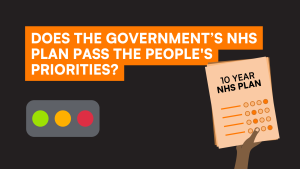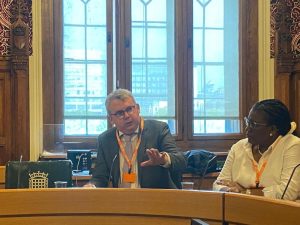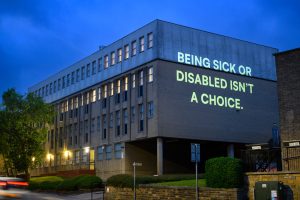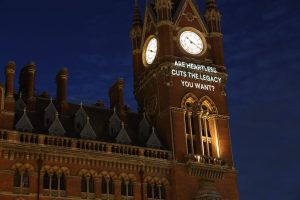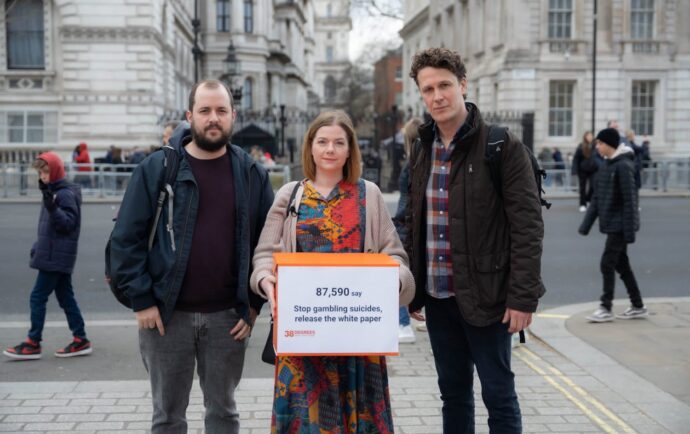
Jun 17th, 2014
What did 38 degrees achieve in the hospital closure clause campaign?
By David Lock QC
This article looks back at the recent “hospital closure clause” campaign and tries to take a dispassionate look at the issues and examine the likely effects of the government climbdown on clause 119 (or was it clause 118 because it kept changing).
The central problem the present government faced – and which previous governments faced – was how to manage change in the way NHS hospitals operate without major public opposition? Amongst all of our public services, NHS hospitals are the services that the public prizes the highest. In the perception of public importance hospitals come above schools, social care support, roads, leisure centres and community centres. Nothing brings a community to the streets quicker than a threat to services at their local hospital. One sniff of unwanted changes in your local hospital and the streets are thronged with angry, banner waving local people who are being whipped up in their indignation by elected and wannabe local politicians. Making changes to our hospitals is one argument every elected politician wants to avoid or cannot be seen to support.
But changes to the configuration of hospitals has happened since the NHS was created in 1948. There is a wide and growing professional consensus across those who understand the complexities of NHS patient outcome data that pretty radical change to the way that our hospitals work is needed to save lives and improve services to patients.
But, and it is a bit “but”, it is often only a professional consensus. Change in the NHS cannot properly be managed only with a professional consensus. That leaves out the people who are most important of all – the patients – out of the loop. It is an inconvenient truth for NHS decision makers that patients pay the bills through their taxes, elect the politicians who make the laws under which the NHS operates and are the only reason hospitals exist. Patients are the most important people in any decision making process. There was a famous “Yes Minister” episode about a new hospital that won every award going for cleanliness, staff morale and efficiency but, one year on, had yet to admit a single patient. Sir Humphrey urged the Minister to be proud of the hospital. When Hacker expressed some reservations Sir H explained in his “let me say this once and I hope you will understand Minister” voice that the hospital functioned so much better without patients. That was a caricature but, like all caricatures, it had a sardonic element of truth.
My impression (through political experience and when assisting NHS bodies with change processes) is that, for far too long, the NHS has defaulted to managing these hugely complex change processes by seeking to establish a professional consensus in favour of changes and as a last step, once the plans are all but agreed, going through a notional “consultation” process with patients and the public. This is perhaps seen most acutely where the driving force behind change is a lack of money for an NHS body or having to make up for bad NHS management over an extended period.
The hospital closure clause campaign brought these arguments into sharp focus. The government wanted to give powers to a Trust Special Administrator (a “TSA”) – something like a liquidator of an NHS trust – to reorganise health services across a series of hospitals belonging to different NHS Trusts if the TSA though this was needed to sort out the financial problems at a single Trust that was in financial difficulty. The Health and Social Care Act 2012 gave a de facto veto on change at a hospital that was under the TSA’s control to the commissioners of NHS care at the Trust in difficulty. “Commissioners” are Clinical Commissioning Groups (“CCGs”), mainly consisting of GPs, that have the power to decide what NHS services an NHS Trust should deliver for the local patient population.
However CCGs are accountable to the public and cannot make commissioning decisions without public and patient involvement. CCGs have comprehensive legal duties to involve patients and the local public in their decision making and so a CCG could not make decisions about whether to approve scaling back or closure of an A & E or obstetric unit at a local hospital without involving patients and the local public in that decision making process. So giving a de facto veto to local commissioners meant that patients and the local public would get a key say in these decisions. The public might not agree with the outcome but at least they would be properly involved at an early stage and the CCG had to ensure they listened and responded before key decisions were made.
The next stage in the story is that the government lost the legal case brought by the Save Lewisham Hospital campaign, which was supported financially by 38 degree members. The courts held that the TSA regime gave powers to a TSA to make changes at a hospital trust to which he had been appointed but had no power to impose change on NHS hospitals run by neighbouring trusts. That stopped a TSA using the Trust Special Administration process as the basis for imposing wide scale changes to hospital services across an area in order to try to solve far greater problems than the insolvency of a single NHS trust.
The government wanted to remove that limitation by legislation and so introduced amendments to the Care Bill to widen the powers of a TSA. However the problem 38 degrees identified was the changes that the government proposals kept the veto for the commissioners of services at the troubled trust but did not give any decision making powers to commissioners of services at other hospitals where changes were being forced through as a result of the TSA process. Unless NHS commissioners were decision makers about proposed changes at their local hospitals, there was no process for the commissioners to involve patients and the public in this decision making (because they were not making any decisions).
So the original proposals meant that a hospital manager from another area or even a private sector accountant could close down a perfectly viable NHS Accident and Emergency Unit, scale back a popular consultant led obstetric unit or close a properly functioning hospital in order to drive patients to a hospital that was in financial trouble in the neighbouring borough in the teeth of opposition from the hospital doctors, local NHS commissioners and with only the bare minimum of public and patient consultation. This was like giving a liquidator of an under-performing supermarket the right to close down a more popular competitor supermarket in order to improve the prospects of the supermarket which had got itself into trouble.
38 degrees pointed out that hospitals were not supermarkets and changes ought only to be made after the public was fully involved in decision making. That objective could only be achieved by making the local NHS commissioners decision makers about what services should stay or were up for possible change at local hospitals. Giving commissioners that role would mean that CCGs had to work hard to involve patients and the public in these decisions before they were made.
The campaign was ultimately successful because, towards the end of the parliamentary process, the government accepted the principle that all NHS commissioners who were affected by changes in their local hospitals should have the same de facto as commissioners of services at the troubled trust. The government introduced a clause which had the same effect as the 38 degrees clause introduced by Paul Burstow MP which gave parity to the decision making positions of commissioners of the affected Trust and any other Trust whose services may be affected by changes proposed by a TSA.
In practice this means that a TSA will not be able to use his appointment as a fig leaf to drive through unpopular changes to NHS hospital services in an area against the wishes to local NHS commissioners. However the big win in this scheme is that, before any changes are agreed to by NHS commissioners at a local hospital, the commissioners will have to undergo a thorough and meaningful engagement exercise with patients and the public. So the commissioners will have a duty to explain why changes at a local hospital might be acceptable, test the proposals from the perspectives of patients and the public and take full account of patient and public views before any decisions are made. This might make clinically driven change slightly slower in the NHS in future, but it will happen with patients and the public being fully informed and involved at an early stage as opposed to being “consulted” when all the key decisions have already been made in meetings of professionals where the public are excluded. It should mean that NHS administrators and clinicians who support changes to NHS services will have to work harder to explain why they support changes to these important public services and hence take the public with them. It should mean that there is a greater chance that clinically necessary change to NHS hospitals is managed consensually with the public rather than in the face of determined public opposition.
38 degree members can feel proud of the changes they help bring about. They achieved a small but significant step on the road to making NHS decision making more accountable to patients and the public.
—–
David Lock QC, who was MP for Wyre Forest (Kidderminster) from 1997 to 2001. He was counsel for the Campaign in the Lewisham Hospital case in the High Court and Court of Appeal and was instructed by 38 Degrees to draft amendments to the Care Bill. These are his personal views.
This article was written because some 38 Degrees members were asking for more details about what we achieved with the Hospital Closure Clause campaign. Please comment below with your thoughts.




